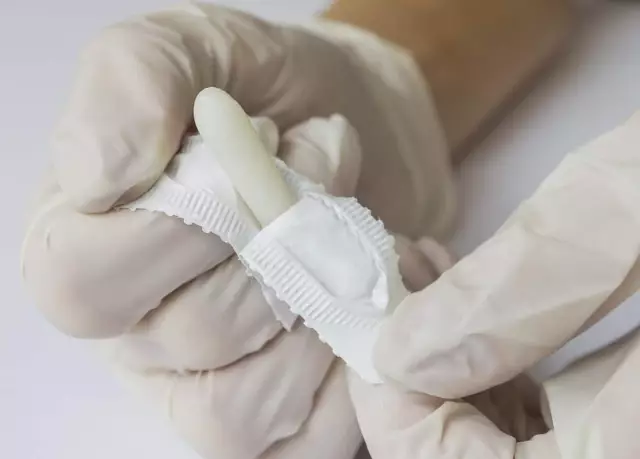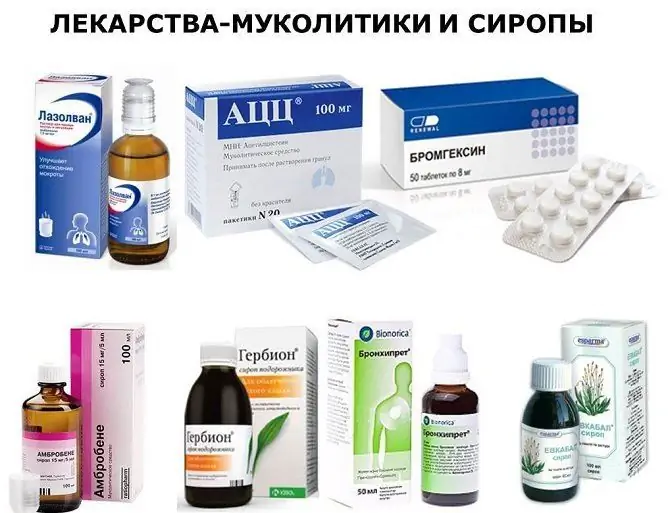- Author Rachel Wainwright wainwright@abchealthonline.com.
- Public 2023-12-15 07:39.
- Last modified 2025-11-02 20:14.
Medicines for sore throats for adults and children
The content of the article:
- The reasons for the development of pathology
- Symptoms and diagnosis of sore throat
-
Sore throat treatment
Local therapy
- Video
Medicines for sore throats for adults and children should be selected by a doctor after examination, based on the clinical picture and taking into account age, the presence of concomitant diseases, etc. It is important to correctly select an effective remedy that will contribute to a quick recovery without the development of purulent and non-purulent complications.

Medicines for the treatment of angina should be prescribed by a doctor
Angina, or acute tonsillitis, is an infectious disease based on acute inflammatory lesions of the parenchyma, lacunar and follicular apparatus of the tonsils. Both an adult and a child from a year and older can get sore throat.
The reasons for the development of pathology
The etiology of the disease is very diverse.
The mucous membrane and lymphoid tissue of the pharynx in the body come into contact with disease-causing agents of the environment. In this regard, bacterial tonsillitis is most common. The disease is often combined with pharyngitis.
Pathogenic bacteria that cause inflammation of lymphoid tissue: staphylococci, streptococci, haemophilus influenzae, gonococci, anaerobes, spirochetes, mycoplasmas and chlamydia. A large etiological role is assigned to group A beta-hemolytic streptococcus, or pyogenic streptococcus.
The cause of inflammation of the palatine tonsils can also be a viral infection: rhinoviruses, adenovirus, influenza viruses, parainfluenza, herpes.
In more rare cases, fungal tonsillitis develops, which is caused by yeast-like fungi of the genus Candida.

The causative agent of sore throat can be transmitted in various ways.
Pathogens enter the mucous membrane of the tonsils through food, airborne droplets, or through direct contact.
Conditionally pathogenic flora of the oral cavity can also cause inflammation of the tonsils with a decrease in the general reactivity of the body and a weakening of local immunity.
Symptoms and diagnosis of sore throat
The severity of symptoms can vary greatly depending on the type of pathogen, the form of the disease.
With angina, signs of intoxication are expressed: fever, muscle and headache, weakness, fatigue, loss of appetite, sleep disturbance.

With angina, the submandibular and cervical lymph nodes increase
Patients complain of pain, soreness, and discomfort in the throat, which are aggravated by swallowing. The submandibular, anterior and posterior cervical lymph nodes increase in size, become swollen and painful on palpation.
On examination, hyperemia, edema and infiltration of the mucous membrane of the palatine tonsils, palatine arches, soft palate, posterior pharyngeal wall are determined. Plaque and purulent follicles are determined, which appear through the mucous membrane of the tonsils in the form of yellowish rounded granules.

Manifestations of acute tonsillitis depend on the causative agent of the disease
The diagnosis is established by a doctor after examination, pharyngoscopy, obtaining data from laboratory research methods.
Typically, patients with a runny nose, cough, sore throat, throat congestion, and no fever have a viral infection. The presence of exudative inflammation of the palatine tonsils, high body temperature, signs of intoxication of the body, cervical lymphadenitis and the absence of cough are highly likely to indicate a bacterial etiology of the disease.
The main method for diagnosing an infectious lesion of the tonsils is microbiological examination. It is extremely important to identify acute streptococcal sore throat, which requires systemic antibiotic therapy.
For express analysis, a streptococcal antigen test (Streptatest) is used. This is a universal method that allows you to determine the presence of group A beta-hemolytic streptococcus in 5 minutes and determine the treatment tactics in time. This test does not exclude the need to perform bacteriological culture regardless of the result obtained.
Sore throat treatment
With the development of acute tonsillitis with severe symptoms of intoxication, hospitalization in an infectious diseases hospital is recommended, and with minor systemic manifestations, the disease can be treated at home, following the treatment regimen prescribed by the doctor.

With an uncomplicated course of the disease, therapy is carried out at home
Also, hospitalization is necessary for a specific infection, so as not to spread it among the healthy population.
For 3-4 days, bed rest, a diet with a predominance of plant and dairy foods rich in vitamins, and plenty of fluids are recommended. Alcohol and smoking are strictly excluded.
Features of therapy, depending on the type of angina:
- viral: antiviral drugs are prescribed;
- bacterial: systemic antibiotic therapy is necessary. It is very important to timely prescribe antibiotics in the presence of angina caused by group A beta-hemolytic streptococcus;
- fungal: treatment includes oral administration of antifungal agents (Nystatin, Ketoconazole, Fluconazole), ascorbic acid, and antihistamines.
The need to prescribe antibacterial treatment from the first day of the disease is based on the data of numerous reviews of scientific articles: earlier prescription reduces the risk of rheumatic (acute rheumatic fever, rheumatic heart disease, glomerulonephritis) and purulent complications (abscesses, mediastinitis, pyelonephritis, otitis media), reduces the severity of symptoms and the duration of the disease …
At the same time, prophylactic treatment with antibiotics for family members of the patient is not justified.
List of antibacterial drugs for the treatment of streptococcal sore throat:
- Phenoxymethylpenicillin;
- Amoxicillin / clavulanate;
- Ceftriaxone;
- Ceftazidime.
Phenoxymethylpenicillin has a high bactericidal activity against group A beta-hemolytic streptococcus. It is well tolerated, has a narrow and targeted spectrum of action, minimally affects the microflora of the gastrointestinal tract. Another advantage of this drug is its low price.

Amoxiclav is an antibacterial drug that affects pyogenic streptococcus
Strong antibiotics that act against a large number of pathogens, including pyogenic streptococcus, are drugs with amoxicillin and clavulanic acid: Amoxiclav, Augmentin.
It is important to observe the frequency of administration and the recommended dosage of the drug. It is selected by a doctor depending on the severity of the clinical manifestations of the disease.
Alternative medicines for sore throat:
- Azithromycin;
- Clarithromycin;
- Cefuroxime;
- Lincomycin.
Macrolides (Azithromycin, Clarithromycin) are prescribed for intolerance to penicillins. They also give a high percentage of eradication of the pathogen.
Cephalosporins (Ceftriaxone, Cefuroxime) have a broader spectrum of action, which negatively affects the microflora of the gastrointestinal tract.
When taking antibiotics, you must follow the basic principles: the optimal course of treatment is 7-10 days; it is necessary to take the drug strictly following the instructions or recommendations of the attending physician; it is impossible to independently reduce the dosage of the medicine. Due to the large number of complications and side reactions, the selection or replacement of an antibacterial agent is carried out by a strictly attending physician.
Parenteral administration of antibiotics is indicated for severe clinical symptoms, intoxication and is carried out in a hospital setting.
Symptomatic therapy is aimed at relieving pain and lowering body temperature. For these purposes, non-steroidal anti-inflammatory drugs are prescribed: Paracetamol, Ibuprofen.
In acute specific tonsillitis, treatment is carried out as part of the therapy of the underlying disease.
Local therapy
The main request of patients with acute tonsillitis is the need to eliminate sore throat. One of the most significant, effective and safe directions in therapy is the use of topical drugs for sore throat.
The advantages of local treatment are in the direct effect on the inflammation focus by targeted drug delivery, reducing the risk of the emergence of resistant strains of normal microflora, minimal systemic action and the effect on the human microbiota.
Warm gargles are prescribed with a solution of Furacilin, Miramistin, tincture of calendula or a decoction of chamomile.

Grammidin is often used for topical treatment of tonsillitis
Lozenges for sore throats, such as Grammidin, are widely used. The drug is also available in the form of a spray. It is recommended for bacterial and fungal infections of the tonsils and is considered one of the best remedies for tonsillitis.
The active ingredient of Grammidin, gramicidin C, is an antibiotic of the tyrothricin group. It is practically not absorbed from the gastrointestinal tract and does not enter the systemic circulation. Gramicidin C has a bacteriostatic and bactericidal effect on pathogenic staphylococci, streptococci, anaerobic microorganisms.
The anesthetic oxybuprocaine, which is part of Grammidin Neo with an anesthetic, has its own bacteriostatic and bactericidal effect. It, in comparison with lidocaine, is characterized by low toxicity and allergenicity. The drug helps to get rid of pain and discomfort in the throat.
When using Grammidin in the form of a spray, hard-to-reach places of the mucous membrane are irrigated: lacunae of the tonsils, lateral ridges, the back wall of the pharynx. The drug is used in a course of up to 7 days.

Lizobact is effective against viruses, bacteria and fungi
An effective remedy for angina is Lizobact. This antiseptic medicine comes in the form of a lozenge tablet. The active substances in its composition are lysozyme and pyridoxine.
Lysozyme is an enzyme that has a direct effect on gram-positive and gram-negative bacteria, as well as fungi and viruses. He takes part in the regulation of local nonspecific immunity.
Streptocide is an inexpensive, good antimicrobial drug that comes in powder and ointment form. It can be used in the treatment of purulent sore throat.
At home, in addition to the main treatment and in consultation with the doctor, you can make an alcohol compress on the anterior cervical region, hot foot baths, steam inhalation and drink milk with honey.
Video
We offer for viewing a video on the topic of the article.

Alina Ervasova Obstetrician-gynecologist, consultant About the author
Education: First Moscow State Medical University. THEM. Sechenov.
Work experience: 4 years of work in private practice.
Found a mistake in the text? Select it and press Ctrl + Enter.






